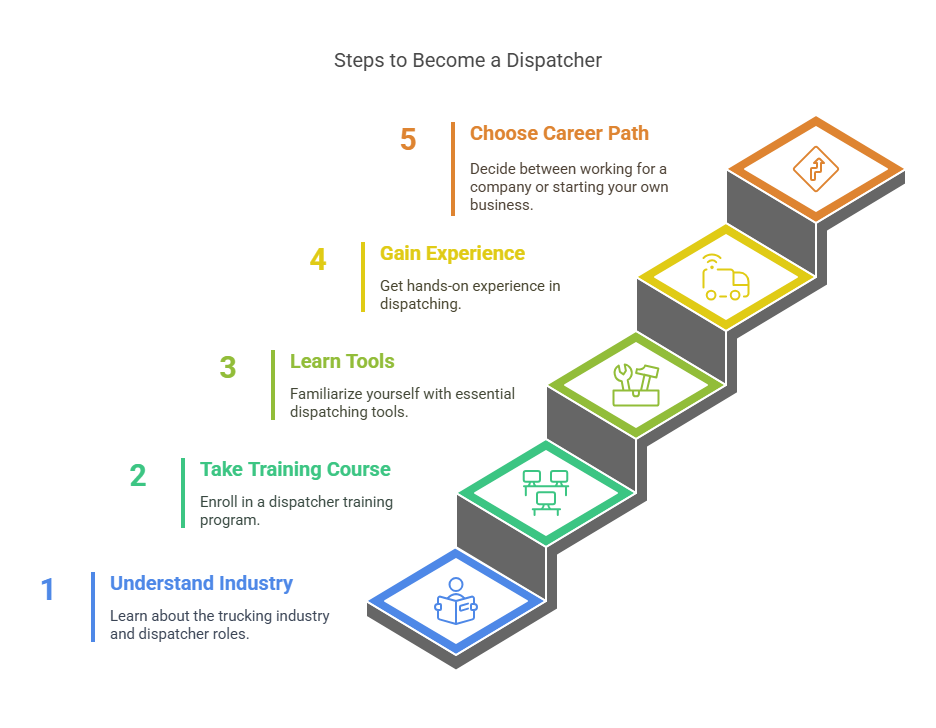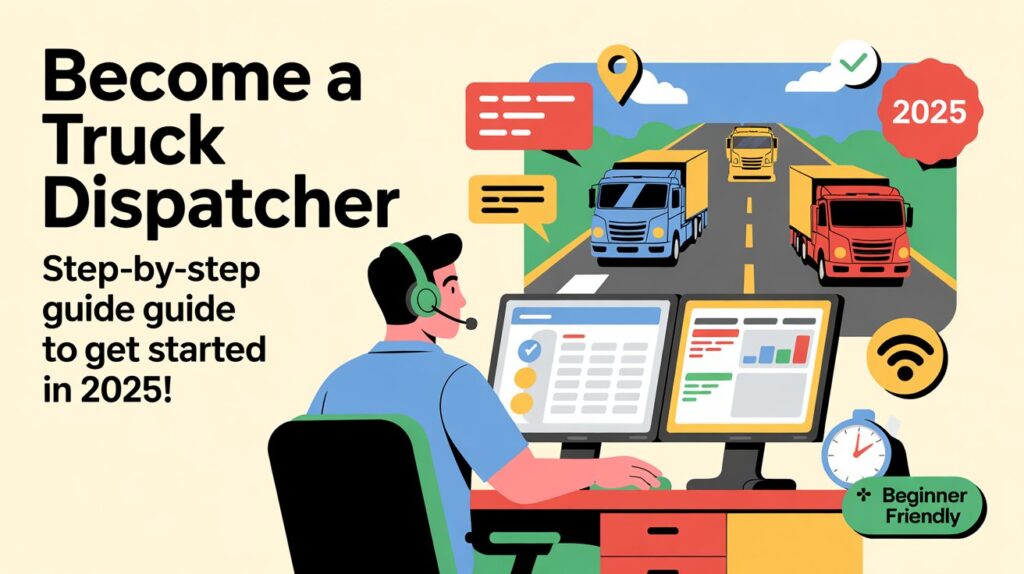Have you ever wondered what it’s like to coordinate the movement of goods across the country—all from the comfort of your home office? Welcome to the world of truck dispatching. If you’re looking for a career that blends communication, strategy, and the excitement of the logistics industry, becoming a truck dispatcher could be your ideal path.
This guide will walk you through everything you need to know—from what the job entails to how to land your first client or job. Whether you’re switching careers or starting fresh, let’s dive in.
What Is a Truck Dispatcher, and Why Does It Matter?
A truck dispatcher is the bridge between freight carriers and drivers. You make sure that trucks are picking up and delivering loads efficiently, safely, and on time. Think of yourself as the air traffic controller of the trucking world.
You might work for a trucking company or independently manage your own clients. Either way, dispatchers keep freight moving—something the world simply can’t function without.
What Does a Truck Dispatcher Actually Do?
You’ll wear many hats as a dispatcher. Here are some of the key responsibilities you’ll handle:
- Scheduling and assigning loads to drivers.
- Communicating constantly with truckers, clients, and brokers.
- Monitoring deliveries, rerouting when necessary.
- Negotiating rates with brokers and shippers.
- Using tools like load boards, GPS tracking, and TMS (Transportation Management Systems).
Your job is to make life easier for truck drivers while maximizing company efficiency and profits. If you enjoy being organized, multitasking, and solving problems in real time—this role might be made for you.
Do You Need a Degree to Become a Truck Dispatcher?
Short answer? No—you don’t need a college degree.
However, here’s what helps:
- A high school diploma or GED
- Dispatcher training courses (online or in-person)
- Familiarity with industry tools (more on that shortly)
You also don’t need a Commercial Driver’s License (CDL), but having basic knowledge of trucking regulations and terminology gives you an edge.
The Skills That Make a Great Dispatcher
You don’t have to be a tech genius or trucking expert on day one. But to truly thrive, these skills are gold:
Must-Have Skills:
- Excellent communication (you’ll talk a lot—clear and confident speech is a must)
- Problem-solving and critical thinking on the fly
- Organizational superpowers (tracking trucks, paperwork, schedules)
- Basic computer literacy
Bonus Traits:
- Calm under pressure
- A proactive attitude
- A knack for negotiation
How to Become a Truck Dispatcher: A Step-by-Step Blueprint
Ready to start? Here’s your roadmap to go from curious beginner to confident dispatcher:
Step 1: Understand the Job and Industry
Spend some time watching YouTube videos, reading dispatcher blogs, or joining Facebook groups. Learn the lingo. Know what freight is. Understand how owner-operators and brokers work.
The better you understand the world you’re entering, the faster you’ll stand out.
Step 2: Take a Dispatcher Training Course
There are tons of affordable online programs that teach the ins and outs of dispatching. These cover:
- How to use load boards like DAT or TruckStop
- How to negotiate with brokers
- Federal regulations (DOT/FMCSA)
- Routing and paperwork management
👉 Popular Options:
- Dispatch Training Center (starting at $299)
- Udemy Dispatcher Courses (budget-friendly for beginners)
Choose a program with good reviews, lifetime access, and hands-on tools.
Step 3: Learn the Tools You’ll Use Daily
You don’t need to master them overnight—but get familiar with these:
- Load boards – Where you find freight opportunities (DAT, TruckStop, 123LoadBoard)
- TMS software – For route planning and documentation (e.g., Tailwind, TruckLogics)
- ELD & GPS tracking tools – To monitor where your drivers are
You’ll also need basic office tools like email, spreadsheets, and Google Docs.
Step 4: Get Some Experience (Optional but Helpful)
This isn’t mandatory, but it’s a confidence booster. Try:
- Working for a small trucking company
- Interning with a dispatch agency
- Dispatching for a friend or family member who owns a truck
Even a few weeks of real-world exposure will help you build your rhythm and resume.
Step 5: Choose Your Path – Employee or Independent Dispatcher?
You have two main career paths:
Work for a Company
- Steady paycheck
- Fewer business headaches
- Great if you’re starting out
Start Your Own Dispatch Business
- Work from home
- Set your own rates and hours
- Build your brand
If you go independent, here’s what you’ll need:
- Register your business (LLC recommended)
- Get an EIN from the IRS
- Draft service contracts for clients
- Set up a professional email and website
- Optional: business insurance
Starting small with one or two owner-operators is a great way to ease in.

How Much Money Can You Make as a Truck Dispatcher?
This is the juicy part, right? Your income can vary based on your experience and business model.
| Type of Dispatcher | Average Monthly Income (USD) |
|---|---|
| Entry-Level Employee | $2,500 – $3,500 |
| Experienced Dispatcher | $4,000 – $6,000 |
| Independent (Home-Based) | $5,000 – $10,000+ |
Independent dispatchers typically charge 5–10% of each load’s value, or a flat weekly fee per truck ($300–$500).
Some experienced dispatchers handling multiple clients make $100,000+ per year—without owning a single truck.
Work From Home: Set Up Your Truck Dispatch Office
Here’s what your home dispatch center should include:
- A reliable computer/laptop
- High-speed internet connection
- Dual monitors (makes multitasking easier)
- A business phone line or VoIP service
- Printer/scanner (for contracts, invoices)
- Load board subscriptions (start with free trials if needed)
Keep your space distraction-free and comfortable. This is your control tower.
The Pros and Cons of Truck Dispatching
Pros:
- Work remotely from anywhere
- Low barrier to entry—no degree or license needed
- You’re part of a growing, recession-resistant industry
- Opportunity to build a business with little overhead
Cons:
- Can be stressful—especially if loads are delayed
- Irregular hours—emergencies don’t care about time zones
- Communication challenges with drivers, brokers, clients
Common Challenges and How to Handle Them
Load Cancellations or Route Issues?
Keep a Plan B ready and establish contacts with multiple brokers.
Difficult Drivers?
Patience, communication, and written expectations go a long way.
Regulatory Compliance?
Stay up to date with FMCSA/DOT changes and use checklists.
Every dispatcher hits a few bumps in the road—what matters is how you adapt.
Tips to Stand Out as a Rockstar Dispatcher
- Build genuine relationships with carriers and clients
- Be responsive—always answer calls and messages promptly
- Learn basic accounting to manage your dispatch income
- Always be learning—freight trends and rules change fast
- Offer extra value (like tracking updates or helpful suggestions)
FAQs About Becoming a Truck Dispatcher
Q: Is truck dispatching stressful?
Yes, especially during emergencies or missed pickups—but systems and planning help a lot.
Q: Can I become a dispatcher with no experience?
Yes! With training and a bit of hustle, you can get started in weeks.
Q: Do I need a CDL or to own trucks?
Not at all. Many dispatchers work without a CDL or owning any trucks.
Q: How long does it take to start earning?
If you’re consistent, you could land your first client or job within 30–60 days.
Bonus: Quick-Start Checklist
Here’s your step-by-step starter kit:
- Take a dispatcher training course
- Get familiar with load boards
- Decide: employee or independent
- Set up your business and home office
- Land your first client or job
- Keep learning, networking, and growing
Final Thoughts: Is Truck Dispatching Right for You?
If you love coordination, communication, and the idea of being part of a vital industry without ever hitting the road, truck dispatching might be your perfect fit. It’s flexible, scalable, and full of opportunity.
You don’t need to be an expert on day one. Just start. Learn. Connect. And before you know it, you’ll be managing freight across the country—right from your kitchen table.

